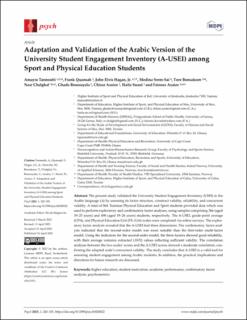Adaptation and Validation of the Arabic Version of the University Student Engagement Inventory (A-USEI) among Sport and Physical Education Students
Tannoubi, Amayra; Quansah, Frank; Hagan, John Elvis; Srem-Sai, Medina; Bonsaksen, Tore; Chalghaf, Nasr; Boussayala, Ghada; Azaiez, Chiraz; Snani, Haifa; Azaiez, Fairouz
Peer reviewed, Journal article
Published version
Permanent lenke
https://hdl.handle.net/11250/3107084Utgivelsesdato
2023Metadata
Vis full innførselSamlinger
Originalversjon
Psych 2023, 5 (2), 320-335. https://doi.org/10.3390/psych5020022Sammendrag
The present study validated the University Student Engagement Inventory (USEI) in the Arabic language (A) by assessing its factor structure, construct validity, reliability, and concurrent validity. A total of 864 Tunisian Physical Education and Sport students provided data which was used to perform exploratory and confirmatory factor analyses, using samples comprising 366 (aged 19–25 years) and 498 (aged 19–26 years) students, respectively. The A-USEI, grade-point average (GPA), and Physical Education Grit (PE–Grit) scales were completed via online surveys. The exploratory factor analysis revealed that the A-USEI had three dimensions. The confirmatory factor analysis indicated that the second-order model was more suitable than the first-order multi-factor model. Using the indicators for the second-order model, the three factors showed good reliability, with their average variance extracted (AVE) values reflecting sufficient validity. The correlation analyses between the two scales’ scores and the A-USEI scores showed a moderate correlation, confirming the adapted scale’s concurrent validity. The study concludes that A-USEI is a valid tool for assessing student engagement among Arabic students. In addition, the practical implications and directions for future research are discussed.

